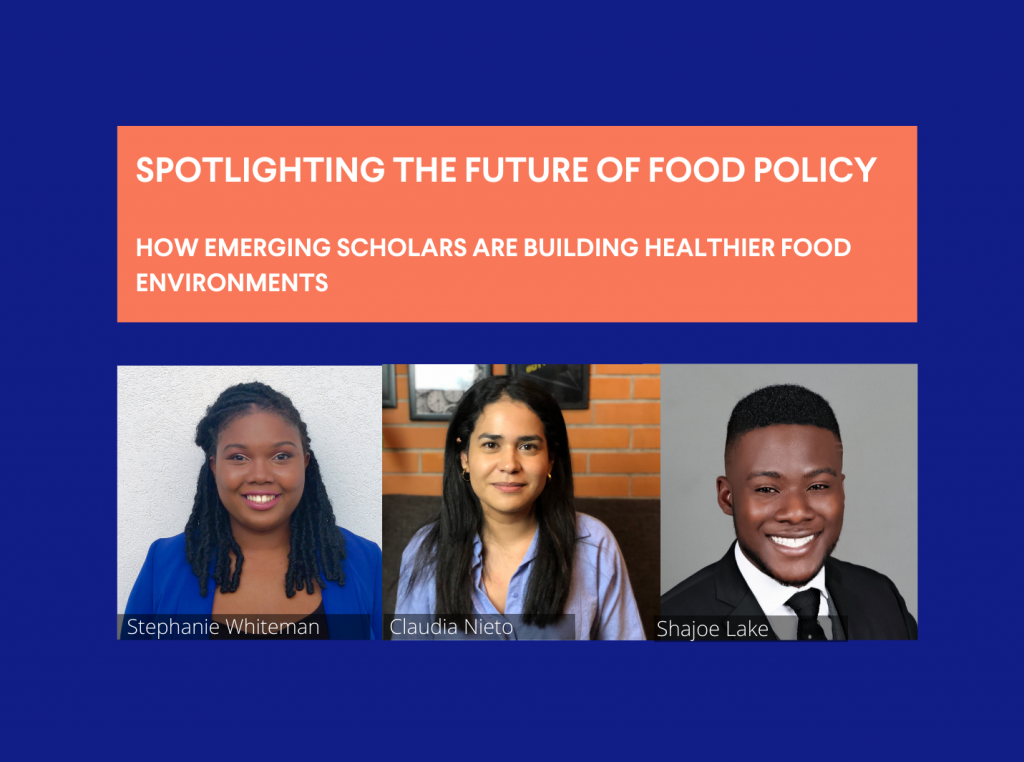Spotlighting the Future of Food Policy: How Emerging Scholars are Building Healthier Food Environments

The application for the Healthy Food Policy Fellowship opens on March 4, 2021!
Every year, we lose nearly 8 million people globally due to unhealthy diets. Often factors like a lack of availability of fresh fruits and vegetables, cost, and ubiquitous advertising of ultra-processed foods create a food environment where healthy eating is nearly impossible – but there is a lot that policies can do to help.
As obesity continues to be a rising challenge — one that the COVID-19 pandemic has brought into even sharper focus — accelerating research to evaluate policies that improve global food environments has become critical. A key component of our Bloomberg Philanthropies’ food policy program is supporting research to figure out what works to shift people to healthier diets. While our work is always grounded in rigorous global and existing country evidence, most countries have research gaps.
Vital Strategies launched the Healthy Food Policy Fellowship in March of 2020 to help build research capacity in countries around the world. The fellowship, funded by Bloomberg Philanthropies, supports outstanding Ph.D. candidates who reside in Barbados, Brazil, Colombia, Jamaica, Mexico and South Africa and are committed to pursuing a field study and research that will enable them to contribute to healthier food environments through the use of public policy.
Today, on World Obesity Day, we are proud to announce that the next round of applications are now open. To learn more about the program, meet our first passionate cohort as they share how the fellowship is helping them improve food environments in their countries.
CLAUDIA NIETO, MEXICO
Claudia Nieto is a doctoral student at the Mexican National Institute of Public Health. Her Ph.D. thesis will focus on the influence of digital marketing on the purchase and consumption of unhealthy food and beverages.
Claudia is passionate about creating healthier food environments in Mexico. She said, “It is a fact that the advertising, including digital marketing of sugary drinks and ultra-processed foods, are influencing children’s and adolescent’s preferences, purchasing, and consumption.” She added, “My research has the potential to contribute to the regulation of the advertising act in Mexico, which currently does not cover digital media.”
She wants to understand the tactics that the food and beverage industry uses to influence food choices and provide recommendations to improve food marketing regulation.
SHAJOE LAKE, JAMAICA
Shajoe Lake is pursuing a Master of Laws in global health law from Georgetown University. He was the recipient of multiple awards—including the Williams, McKoy & Palmer prize for the Most Outstanding Male Graduate at Norman Manley Law School, the University of West Indies (UWI) Vice Chancellor’s Award for Excellence in Leadership and The UWI Award for Outstanding Performance in Leadership and Service, among others.
“The Fellowship provides me with the resources to pursue a cutting-edge health law program. I am being taught by global leaders in the field how to critically examine novel, cross-sectional research from a global and national perspective,” said Shajoe. “It has improved my aptitude for research analysis that is essential to developing evidence-based policies in the fight against NCDs.”
He believes that to effectively address NCDs, the food environment has to be significantly regulated, through evidence-based policies that are defensible against industry challenges.
STEPHANIE WHITEMAN, BARBADOS
Stephanie Whiteman is a doctoral student pursuing a Ph.D. in nutritional epidemiology from the University of West Indies. She is working as a research associate at the George Alleyne Chronic Disease Research Centre on projects related to the relationship between the food environment and health. She is also a fellow for the Yale Transdisciplinary Collaborative Center’s Data Sharing Work Group. Aside from her research roles, Stephanie is also a youth advocate for the Healthy Caribbean Coalition and an NCD Child Young Leader.
Stephanie called becoming a part of the Healthy Food Policy Fellowship “an undeniable blessing.” She added, “It has not only helped me financially, but it has also connected me to a network of other researchers and collaborators in the field.”
She believes that her research will help identify possible food deserts and food swamps in Barbados that will enable her to provide evidence-based suggestions to create a healthier food environment for Barbadians.
About the Healthy Food Policy Fellowship Application
The application for the Healthy Food Policy Fellowship is open from March 4 – March 31, 2021. For more information on how to apply, visit: https://www.vitalstrategies.org/FoodPolicyFellowship or submit questions via email to fellowships@vitalstrategies.org.
Successful applicants are awarded a multiple-year Fellowship for the duration of their Ph.D. program (up to five years). In general, the Fellowship covers tuition, accommodation, health-insurance and study-related travel, if appropriate. Each Fellowship is dependent on the needs of the recipient, country of residence/school, and is bound by the funder’s financial parameters.
To learn more about the Food Policy Program, visit: https://www.vitalstrategies.org/programs/food-policy/